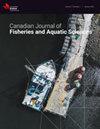Multiple environmental drivers across life-stages influence Yukon River Chinook salmon productivity
IF 2.2
2区 农林科学
Q2 FISHERIES
Canadian Journal of Fisheries and Aquatic Sciences
Pub Date : 2023-10-10
DOI:10.1139/cjfas-2022-0254
引用次数: 0
Abstract
Recent declines of Yukon River Chinook salmon (Oncorhynchus tshawytscha) populations have severely impacted people residing in the Yukon and Alaska. Evidence-based conservation strategies focused on stock recovery and adaptation are urgently needed but are limited by our understanding of what is driving declines, particularly in Canadian portions of the Yukon River basin. We examined how multiple environmental drivers may be influencing Canadian-origin Yukon River Chinook salmon productivity for eight populations over a 28-year period. We found that productivity was related to various environmental and ecosystem processes acting cumulatively over multiple life stages and across broad geographic scales. Productivity decreased in association with warmer upriver migration temperatures, wetter freshwater juvenile rearing habitats, and increasing abundances of potential marine competitors. In contrast, productivity increased in years with warmer and snowier winters and earlier spring onset. We found that different populations had similar relationships with environmental drivers, with potentially negative implications for regional fisheries stability. Our findings provide insight into how Chinook salmon are responding to rapid environmental change and can help inform salmon conservation initiatives and sustainable harvest strategies.横跨生命阶段的多种环境因素影响育空河奇努克鲑鱼的产量
最近育空河奇努克鲑鱼(Oncorhynchus tshawytscha)数量的下降严重影响了居住在育空地区和阿拉斯加的人们。我们迫切需要以证据为基础的保护策略,重点关注种群恢复和适应,但由于我们对导致种群数量下降的原因的理解有限,尤其是在加拿大育空河流域。我们研究了在28年的时间里,多种环境因素如何影响加拿大育空河8个种群的奇努克鲑鱼产量。我们发现,生产力与各种环境和生态系统过程有关,这些过程在多个生命阶段和广泛的地理尺度上累积作用。生产力的下降与上游迁移温度的升高、淡水幼鱼饲养栖息地的湿润以及潜在海洋竞争对手丰度的增加有关。相反,在暖冬多雪和早春的年份,产量增加。我们发现,不同的种群与环境驱动因素有着相似的关系,这对区域渔业稳定有潜在的负面影响。我们的研究结果为奇努克鲑鱼如何应对快速的环境变化提供了见解,并有助于为鲑鱼保护倡议和可持续捕捞战略提供信息。
本文章由计算机程序翻译,如有差异,请以英文原文为准。
求助全文
约1分钟内获得全文
求助全文
来源期刊

Canadian Journal of Fisheries and Aquatic Sciences
农林科学-海洋与淡水生物学
CiteScore
4.60
自引率
12.50%
发文量
148
审稿时长
6-16 weeks
期刊介绍:
The Canadian Journal of Fisheries and Aquatic Sciences is the primary publishing vehicle for the multidisciplinary field of aquatic sciences. It publishes perspectives (syntheses, critiques, and re-evaluations), discussions (comments and replies), articles, and rapid communications, relating to current research on -omics, cells, organisms, populations, ecosystems, or processes that affect aquatic systems. The journal seeks to amplify, modify, question, or redirect accumulated knowledge in the field of fisheries and aquatic science.
 求助内容:
求助内容: 应助结果提醒方式:
应助结果提醒方式:


